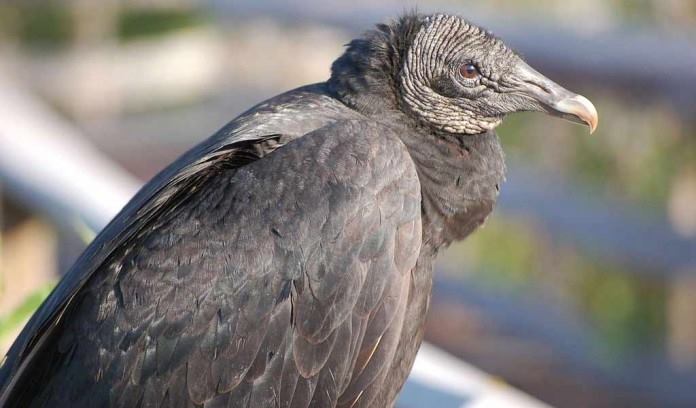
Brought to you by WBIW News and Network Indiana
Last updated on Tuesday, April 24, 2018
(UNDATED) - Dubois Purdue Extension reported that some farmers have lost cattle — especially newborn calves — from black vultures.
The Dubois Free Press reports farmers should be alert to predation possibilities by the large birds and should become familiar with ways to reduce damage often caused by these predators.

Two species of vultures inhabit southern Indiana.
The best-known species is the beneficial turkey vulture. However, there is another species of vulture that is increasingly a menace to beef producers. The black vulture is a smaller but more aggressive vulture that is characterized by black feathers, except for silvery-white primary feathers that show during flight, and a brown, gray, or black featherless head. Black vultures usually flock together, sometimes in the company of turkey vultures. Native to the southern United States and South America, black vultures have been spreading northward into the Midwest and New England.
Black vulture populations have been on the rise since the passage of the Migratory Bird Treaty Act. As the black vulture population increases, the threat to livestock rises. In southern Indiana, we have seen a combination of black vultures moving into the area and an increase in total population of vultures.
Unlike turkey vultures, which only feed on carrion, black vultures are known to attack infant livestock and wildlife, particularly newborn calves. Typically the vultures will attack the eyes first, blinding the calves, and then proceeding to other parts of the body. They have also been known to attack cows as they give birth. When chased off, black vultures will stay nearby and wait for their opportunity to return.
Black vultures are protected by the Migratory Bird Treaty Act, so it is illegal to shoot them without a permit. Depredation permits may be obtained from the Region 3 U.S. Fish and Wildlife Service Migratory Bird Permit Office that will allow the capturing and killing of nuisance birds. There is no permit needed to scare or herd vultures away from livestock.
Control methods that are reported to work include habitat modification to remove easy roosts for vultures, hazing with red lasers, and hanging the effigy or "fake" carcass of a dead vulture in the area.
Livestock guardian dogs, traditionally used for preventing predation of sheep and goats, may be useful in reducing losses from vultures. Great Pyrenees, Anatolian Shepherds, Maremmas and related breeds of guardian dogs are well-known for their abilities to prevent losses in sheep and goat herds. They are effective against most types of predators, including predatory birds. While not traditionally used with cattle and other large livestock species, some small ruminant owners who also own cattle report success in keeping the dogs with cattle.
Regardless of the method used for preventing losses, close monitoring of livestock aids in the maintenance of a healthy herd.
For a depredation permit contact:
Migratory Bird Permit Office
5600 American Blvd. West
Suite 990
Bloomington, MN 55437-1458
Tel. (612) 713-5436
Email: permitsR3MB@fws.gov
1340 AM WBIW welcomes comments and suggestions by calling 812.277.1340 during normal business hours or by email at comments@wbiw.com
© Ad-Venture Media, Inc. All Rights Reserved.